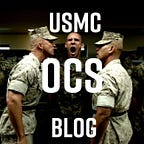Application Advice from a Successful Candidate: Part II of III
Thank you to Candidate C for taking some time to share advice you learned through your long, yet successful, Application! Stay tuned for more parts throughout this week.
What characterized your own application?
Priority Components:
The application package you submit to the regional board has many items on it but the main things they look at are:
- what the OSO thinks of you (from the interview to every day interactions at the office or during pool functions)
- college GPA per semester and cumulative (they also take into consideration your course of study, aka a 2.0 Engineer major vs a 4.0 Wheat bread major)
- PFT score
- the letters of recommendation that you submit
- your SAT/ACT score.
The above are confirmed by conversations I’ve had with a former OSO Major, my current OSO, and I’ve seen the whiteboard in the OSO’s office, which had a grid with your name on the left with 5 items next to it. The office staff ranks you against other candidates in their area of operations by GPA, ACT score, and PFT. The other two items are just admin things for the OPS officer, the University you attend and a checkbox for medically qualified.
Secondary Components:
The secondary material that matters greatly but not as much as the above-mentioned items are extracurricular involvement, sports involvement at the high school or collegiate level, leadership experience, your essay, and your photo (wear a suit or your charlies if you are in the reserves). Extracurriculars can be anything from clubs, club sports teams, volunteering, and etcetera.
How did you build such a good resume?
Work hard as soon as possible. The Marine Corps does not want an Officer who lived an easy life full of partying and easy cruising in high school and college. I started volunteering when I was a freshman in high school and volunteered around 120 hours by the time I graduated. I was in German club, Interact volunteering club, and ultimate Frisbee club in high school. Studied TaeKwonDo at a dojang from ages 10–18 and earned my 3rd degree black belt from the Republic of Korea my senior year in high school which took 4 years to complete. I ran 4 years of high school cross country with 2 years as varsity. I competed in various local and regional martial arts tournaments and was the captain of a martial arts team that trained for and competed at an international competition.
NROTC for an OCS Applicant?
Half of my resume was from a year or so of NROTC in college. You can be complacent in NROTC, and as long as you aren’t extremely terrible at everything you will commission. However, if you want to look good for a board, be active and involved your local NROTC unit. I was on the Close Order Drill team, Rifle/Pistol team, sailing team, and was selected partially by my midshipman peers and partially by 3 Navy O-3 to be the rifle/pistol team commander for our unit going to compete at the University of Colorado Boulder NROTC drill meet. I was selected to be fire team leader at one of our yearly field training exercises and volunteered around 150 hours of community service while in college.
Extracurricular Leadership Advice
You need to be aggressive when seeking out leadership and volunteer experience. Just because you slacked during high school and didn’t do sports or clubs doesn’t mean you are in a bad spot. Wherever you are right now, if this program is what you want, start immediately. You are carrying a full academic load of at least 12–14 credits, a part time job, a social life, a family, whatever. Great, you are a normal college student! Stand out from the crowd and volunteer for your local animal shelter, ask your peers if they need tutoring, and ask your local libraries if they could use unpaid assistance. Whatever it is that needs doing in your community, do it. Not just for your resume which the board will see but to affirm that being a leader amongst your peers and in your community is what you truly are. Try organizing a community event for your apartment or dorm and consider it both volunteer hours and community service.
Things that show your knack for logistics, organization, attention to detail, perseverance, endurance, and overall leadership cannot hurt you in any way and will make you stand out. Joining your local NROTC battalion is something I did but would not recommend for everyone and I will talk about that in a later post.
